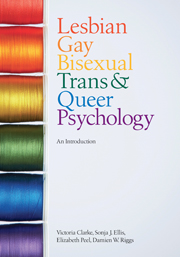Book contents
- Frontmatter
- Contents
- List of boxes
- Introduction: how to read and use this book
- Section I History, contexts and debates in LGBTQ psychology
- Section II Understanding social marginalisation in LGBTQ lives
- Section III LGBTQ experiences across the lifespan
- 7 Young people, coming out and identity development
- 8 Relationships
- 9 Parenting and family
- 10 Ageing and old age
- Conclusion
- Glossary
- Additional resources
- References
- Index
- References
8 - Relationships
from Section III - LGBTQ experiences across the lifespan
- Frontmatter
- Contents
- List of boxes
- Introduction: how to read and use this book
- Section I History, contexts and debates in LGBTQ psychology
- Section II Understanding social marginalisation in LGBTQ lives
- Section III LGBTQ experiences across the lifespan
- 7 Young people, coming out and identity development
- 8 Relationships
- 9 Parenting and family
- 10 Ageing and old age
- Conclusion
- Glossary
- Additional resources
- References
- Index
- References
Summary
Overview
• Legal recognition of same-sex relationships
• Comparing same-sex and different-sex relationships
• Sexual practices
• Beyond the normative couple
There are a number of stereotypes about LGBTQ relationships. These include the idea that non-heterosexual people are unable to form intimate relationships and that they live lonely lives; that same-sex relationships are unstable or mimic traditional heterosexual roles; and that gay men and bisexuals have multiple sexual partners (and that this is a negative thing). As you will see in this chapter, the research on same-sex relationships shows that these stereotypes are not true, and that often they reflect normative assumptions about what constitutes ‘good’ relationships. ‘Same-sex’ couples comprised of bisexual and trans people in relationships with people of the same sex/gender have been largely ignored in the psychological literature to date. Therefore this chapter focuses mainly on lesbian and gay relational experiences.
Legal recognition of same-sex relationships
As same-sex relationships have been historically marginalised, partnership rights have become an important political goal for lesbians and gay men (but see Kandaswamy, 2008). Elizabeth Peel and socio-legal scholar Rosie Harding conducted an online survey with 1,538 LGBTQ people from twenty-seven countries and found that 94.5 per cent agreed that same-sex couples should be able to marry ‘just like’ different-sex couples (Harding and Peel, 2006). The absence of legal recognition has had negative consequences for LGBTQ people.
- Type
- Chapter
- Information
- Lesbian, Gay, Bisexual, Trans and Queer PsychologyAn Introduction, pp. 173 - 193Publisher: Cambridge University PressPrint publication year: 2010



